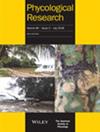verecundum Paraymnodinium sp.nov.(Gymnodinales,Dinophyceae),日本混合营养甲藻的一个新种
IF 1
4区 生物学
Q2 MARINE & FRESHWATER BIOLOGY
引用次数: 2
摘要
从日本宫城县Kitsunezaki采集的沙子样本中分离出横口氏和Horiguchi sp.nov.,并根据使用光学、扫描和透射电子显微镜的观察以及分子分析进行了描述。细胞数为9.4–17.1 μm长,5.7–13.6 μm宽,呈现底栖性生活方式。它们在外泌体上有一个类似沟延伸的沟,一个眼点,线虫囊和带有分离类囊体的多个叶绿体。它们通过吞噬的方式摄取猎物细胞,这表明它们具有混合营养。这些特征与一个已知的Paraymnodinium属物种,P.stimaticum相同。然而,与豆状P.verecundum不同的是,verecundm表现出负趋光性并具有脓疱。线虫囊和鞭毛器超微结构的额外差异表明这两种甲藻是不同的物种。基于串联的18S和28S核糖体DNA序列的系统发育分析在严格意义上的金藻分支内的副金藻物种的一个强大分支中回收了verecundum。verecundum的姐妹是柱头小蠊,但它们显然是分开的。因此,该甲藻被认为是Paragymnodinium属中的一个新种。本文章由计算机程序翻译,如有差异,请以英文原文为准。
Paragymnodinium verecundum sp. nov. (Gymnodiniales, Dinophyceae), a new species of mixotrophic dinoflagellate from Japan
Paragymnodinium verecundum Yokouchi & Horiguchi sp. nov. was isolated from sand samples collected at Kitsunezaki, Miyagi Prefecture, Japan, and described based on observations using light and scanning and transmission electron microscopy, together with molecular analysis. The cells were 9.4–17.1 μm long and 5.7–13.6 μm wide and showed a benthic lifestyle. They possessed a sulcal extension‐like furrow on the episome, an eyespot, nematocysts and multiple chloroplasts with separated thylakoids. They ingested prey cells by engulfment, indicating a mixotrophic nutrition. These characters are shared with a known species of the genus Paragymnodinium, P. stigmaticum. However, unlike P. stigmaticum, P. verecundum showed negative phototaxis and possessed a pusule. Additional differences in the ultrastructure of the nematocysts and the flagellar apparatus indicated that these two dinoflagellates are different species. A phylogenetic analysis based on concatenated 18S and 28S ribosomal DNA sequences recovered P. verecundum in a robust clade of species of Paragymnodinium within the clade Gymnodinium sensu stricto. The sister to P. verecundum was P. stigmaticum, but they were clearly separated. Therefore, this dinoflagellate was concluded to be a new species in the genus Paragymnodinium.
求助全文
通过发布文献求助,成功后即可免费获取论文全文。
去求助
来源期刊

Phycological Research
生物-海洋与淡水生物学
CiteScore
3.60
自引率
13.30%
发文量
33
审稿时长
>12 weeks
期刊介绍:
Phycological Research is published by the Japanese Society of Phycology and complements the Japanese Journal of Phycology. The Journal publishes international, basic or applied, peer-reviewed research dealing with all aspects of phycology including ecology, taxonomy and phylogeny, evolution, genetics, molecular biology, biochemistry, cell biology, morphology, physiology, new techniques to facilitate the international exchange of results. All articles are peer-reviewed by at least two researchers expert in the filed of the submitted paper. Phycological Research has been credited by the International Association for Plant Taxonomy for the purpose of registration of new non-vascular plant names (including fossils).
 求助内容:
求助内容: 应助结果提醒方式:
应助结果提醒方式:


